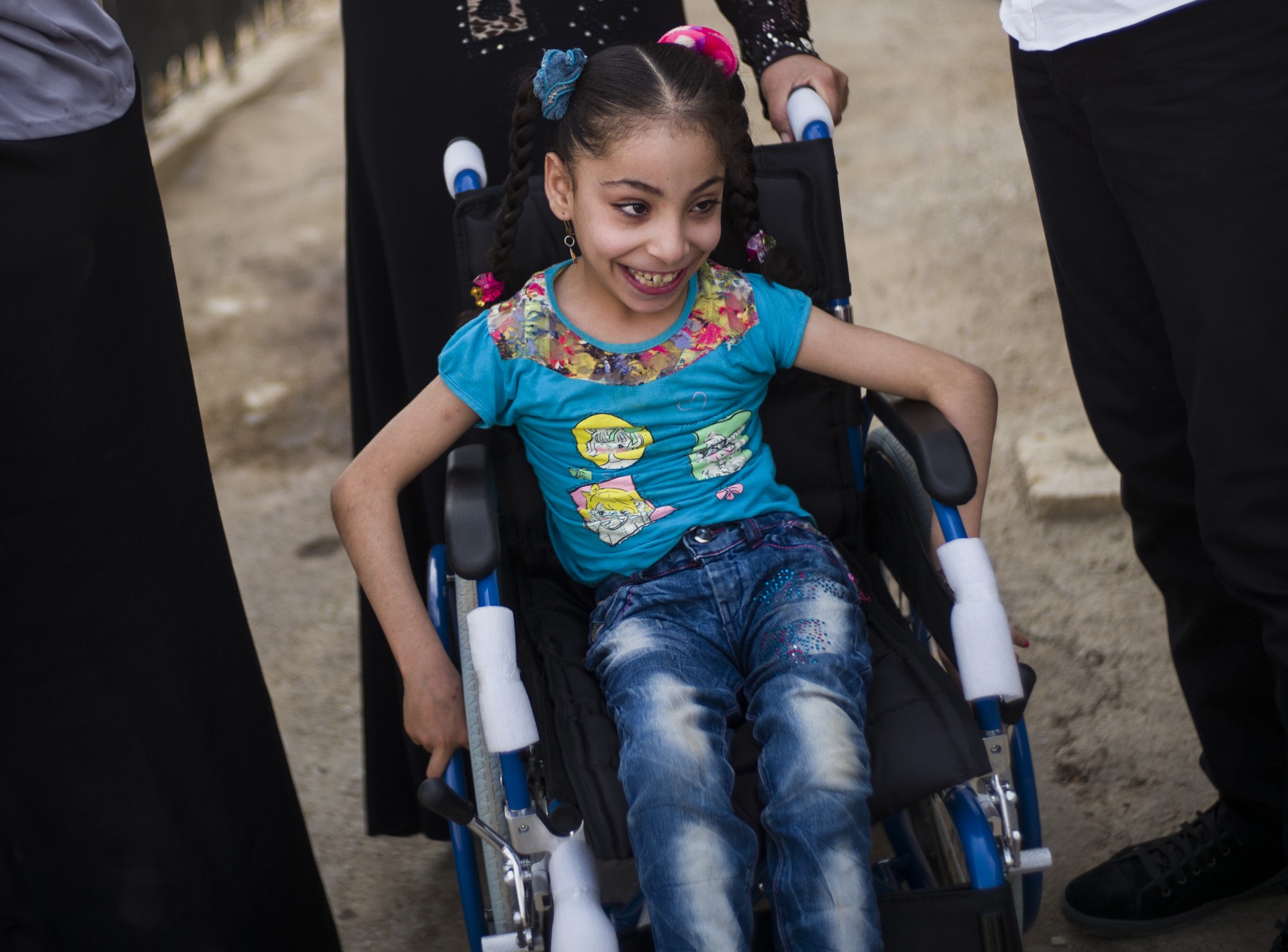Dalal, her three brothers and sisters, parents and the rest of her family live on the second floor of a building in a small town in Beqaa Valley. To reach their apartment in this unfinished building where the family has taken refuge since March 2012, you have to climb a set of stairs. Because Dalal’s parents, older sister and younger brother all have hearing impairments, most of the burden of supporting the family falls on her older brother and aunt.
“Things got much too dangerous for us in 2012, so we fled,” explains Dalal’s mother, Hiba. “My husband was already working in Lebanon. I carried Dalal in my arms and my eldest son had to do all of the talking on the road to get us to Lebanon. The journey was exhausting.”
Dalal is given follow-up care by Mohammed and Zeinab, a Handicap International physiotherapist and social worker. “Dalal’s big brother was the one who got in touch with us,” says Zeinab. After meeting the little girl, the team decided to bring her a wheelchair so she could move around more easily.
“Today, we’re going to teach Dalal and her mother how to use the wheelchair. We’ll show them how to sit in it safety, and move around, but we’ll also show them how to do things like getting over small steps between rooms,” says Mohammed.
When Dalal sees her colourful new wheelchair for the first time, her face lights up with a huge grin. According to Hiba, this mobility aid will make life much easier: “Dalal can’t walk by herself. I have to carry her around a lot, so when we go far, or if I have to pick her up a lot, it hurts my back. She’ll be more independent in her wheelchair and she’ll finally be able to play with the other children in the building again.”
Stuck indoors for more than a year
Dalal hasn’t left the building for a year and a half: “I really worry about her. I’m worried she’s going to hurt herself falling because she can’t control her movements very well. I’ll feel a lot better now I know she’s in her wheelchair when she’s outside,” says her mother.
After some muscle-strengthening exercises, Mohammed helps Dalal sit up in the chair. She tries out her wheelchair for the first time in the living room, then the physiotherapist shows her how to push it:
“I do this exercise because it’s a fun way of helping Dalal strengthen her leg muscles. Although the wheelchair will make her more independent and she can play with her friends, it’s still really important to use her muscles by doing exercises, like standing up.”
As Dalal does her exercises, her mother and aunt, Amina, explain that the family’s children don’t go to school: “We don’t have enough money to send the children to school. And schools aren’t adapted to the needs of Dalal or my youngest son. We had the same problem in Syria,” says Hiba. “My husband and oldest son work at the market to earn a bit of money. It’s not enough but it’s better than nothing,” she adds.
“Our lives here are hard. I want a better life. But what I really want is for peace to return to my country so we can live there again in safety with our family,” says Amina, who hasn’t seen the rest of her family for more than two years.
Exploring her surroundings
Mohammed and Zeinab show Hiba how to get her daughter’s wheelchair over the doorstep and through the entrance. The family and Handicap International’s team then take Dalal outside. “Dalal can use her wheelchair to go out and take part in all sorts of activities. It’s important to think about her mobility and her well-being,” says Mohammed.
Outside, Dalal is nervous to start with but soon begins exploring her surroundings. “Well done, Dalal!” exclaims her grandmother and her grand-daughter’s face lights up.
* Project funded with the support of The European Commission’s Humanitarian Aid and Civil Protection Department – ECHO

Dalal, 7, can now leave home again thanks to her wheelchair provided by Handicap International.
© C. Fohlen / Handicap International






